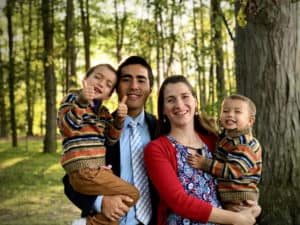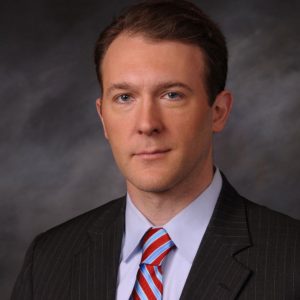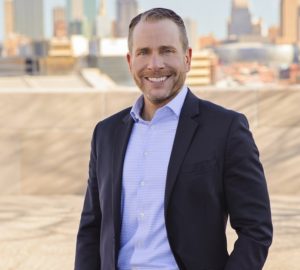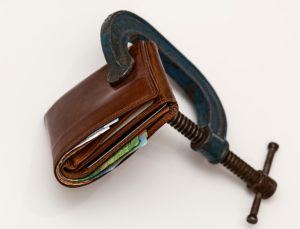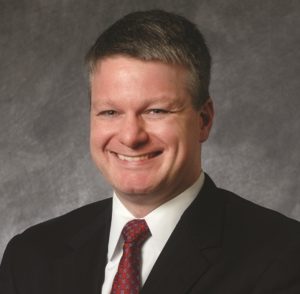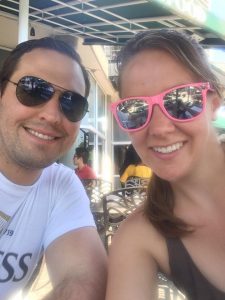“I’m from a small town in SE Wisconsin. My undergraduate degree is from UW Green Bay. I spent 13 years on corporate America with various jobs in different industries; travel wholesale, corporate retail, hospitality, video game distribution, eCommerce. After getting burned out, I left all that behind me to become a high school business teacher in 2015.
My wife and I welcomed our first child, Callahan, in March of 2017. We decided that she would continue in her career and I’d stay home with him.
During this time, we grew tired of making good money but having nothing to show for it. I found Dave Ramsey’s baby steps and we worked that plan starting at the beginning of 2016. We ended up paying of $380k of debt in 38 months and paid our last mortgage payment on Feb 15 of 2019. We didn’t have a lot of consumer debt, just a car note. We did end up selling our condo that we were renting, so that erased 90k in debt. The rest was our mortgage and we plowed right through that!
After going through this process, I enjoyed it so much that I wanted to help others through their own financial journey. Recently I’ve become licensed as a financial advisor. But I want our story to be a beacon of hope for anyone struggling with debt or a similar financial story.”
Denis O’Brien [0:37]
Welcome to Episode 188 Kyle from ClearStep financial. Hey money clan, a warm welcome to the chain of wealth podcast. So glad to have you here. My name is Denis O’Brien. And I’m Katie Welsh. So Katie, interesting story today someone that’s paid off a ton and I mean a ton of debt.
Katie Welsh [0:59]
I love the story. I don’t know what about it. But it just makes me walking away. I feel so good and so proud. And I feel like, whenever I hear other people making a really great accomplishment, I take that in as well. If they can do it, then I can do it.
Denis O’Brien [1:16]
Yeah, I also think that it really highlights if you put your mind to something. And if you have a clear goal, there’s nothing to stop you from achieving that goal.
Katie Welsh [1:25]
And having that mindset sometimes I think is really challenging.
Denis O’Brien [1:30]
Yeah, it definitely is. So guys, if you would like to enroll in our debt course head on over to chainofwealth.com/debtcourse, we’re still currently onboarding people. The course is still currently under development. But we are looking to give access to five lucky people. And who knows we may push up number up a little bit, but we’ve had a ton of people apply already. That’s chainofwealth.com/debtcourse all right, Kate, are you ready to dive in?
Katie Welsh [1:56]
Yeah.
Denis O’Brien [1:56]
Awesome. Let’s do it.
Welcome to chain of wealth. here’s your host, Denis inspiring you to begin your journey of financial freedom.
Kyle spent 13 years in corporate America with various jobs in different industries, travel wholesale, corporate, retail, hospitality, Video game distribution, e commerce, the list goes on. After getting burned out Kyle left all that behind to become a high school business teacher in 2015 Kyle realized that despite him and his wife earning good money, they had nothing to show for it. So they embarked on Dave Ramsey’s baby steps and works on our plan starting in the beginning of 2016. They ended up paying off over a $380,000 of debt in just 38 months. And they recently made the last mortgage payment on February 15 of 2019. Welcome Kyle.
Kyle Depiesse [2:55]
Hey, guys.
Katie Welsh [2:57]
So thank you so much for coming on the show. Um like Denis said you guys had over $380,000 worth of debt?
Kyle Depiesse [3:6]
Yeah.
Katie Welsh [3:7]
Yaho. So what did that comprise of?
Kyle Depiesse [3:11]
Yeah, it takes your breath away when you when you look at that number. And so what what that included was, we had $15,000 in a car loan just on our Ford Explorer. We had $90,000 in a condo mortgage, which I had bought prior to my wife and I being married, and we were renting it in then the remainder 275,000 was in our primary mortgage. And so that’s what it was made up of. And we ended up we did end up selling that condo, about halfway through our journey. And so you can take out that $90,000. And so that’s what yeah, that’s what it was made up of.
Denis O’Brien [3:45]
Well, that’s still a massive chunk of change to pay off. And Kyle if I may be so bold to ask how old are you now?
Kyle Depiesse [3:51]
Yeah, good question Denis, I don’t mind at all. I just, I turned 39 on May 13 of this year, and my wife is a little bit younger
Denis O’Brien [4:1]
Well, congratulations, like having sort of knocked out such a massive amount of debt. So early on in your guys’s life, you’re going to be set and everything you basically make from here on out is essentially pure disposable income, you don’t have anyone knocking on your door, trying to say hey, you owe money, it’s not for a car loan not for a house nothing. So you guys have really set yourselves up really well for later in life.
Kyle Depiesse [4:26]
Yeah, and being a numbers, nerd guy that I am an analytical is fun to just plug some numbers into some projections and compound interest and the rule of 72. And it really kind of gets you excited to see what that looks like. And just you know what you’re able to do and to give and to help into generational change was a big thing that motivated my wife and I we have a son who’s two years old. And we just really wanted to kind of get into legacy planning. It’s really kind of fun to see those numbers, extrapolated.
Katie Welsh [4:56]
Yeah. So I have two questions for you. First, what was your strategy in paying off all this debt? Were you trying to cut back your expenses? Were you guys getting extra jobs? What were you doing? I know, you follow the Dave Ramsey plan. But
Kyle Depiesse [5:13]
yeah,
Katie Welsh [5:14]
what
Kyle Depiesse [5:14]
Yeah,
Katie Welsh [5:15]
what were the little detail?
Kyle Depiesse [5:16]
Sure, good question. And I think our story is maybe a little bit unique in the sense that when we started this journey, in January of 2016, I was a high school business teacher, and my wife is in the staffing and recruiting industry. And we had our son in in March of 2017. And when that happened, we decided that I would stay home. And so I became a stay at home dad. And we looked at my wife’s income and her earning potential. And she was compensated based on heavily commissioned, and I know my wife really well, she’s a really hard worker, we were really starting to see her job kind of take off. And so we kind of focused on doing everything we could to allow my wife to be really successful. And we were really fortunate really blessed through this process, and that our income almost doubled throughout that time. And that was even with dropping down to one income. And so you know, when I look at a lot of folks that do kind of the Dave Ramsey plan, I see a lot of people cutting expenses. And you can only do that to a certain point. But the other side of the equation, which is really the exciting side is your income. And I think a worthwhile exercise and something that my wife and I did is we sat down, we said how do we double our income in five years? And I think that’s really important to do. And so we Yeah, of course, we were mindful of our expenses. We knocked out that car payment, we didn’t have a car payment throughout our mortgage was a small number in terms of a percentage of our take home. We didn’t go on vacation. So we do like most people do. But we’ve really focused on our income and the earning potential. And that even meant that I was a stay at home dad for a period of time.
Katie Welsh [6:54]
And what really inspired that whole move, because it sounds like you guys changed your entire lifestyle.
Kyle Depiesse [7:1]
Oh, we got Yeah, great question, Katie, we got so radical. And this is what started it. I usually try and you know, set goals and recap between the week of Christmas and New Years. And so I did that, you know, kind of Christmas 2015 leading into 2016. And we set goals by category, like a lot of people do, and financials, one of them. And I’m really passionate about it. And so what I don’t know, remember, I don’t remember where I heard this. But you can log on to the Social Security dot gov website, and you create a profile, obviously using your social security number. And it spits back your life to date earnings. And so when I did that, I got my number, how much I made my lifetime. And it was just over a million dollars in my mid 30s. And I looked around I’m like, well, where did it all go?
Katie Welsh [7:47]
What a humbling experience.
Kyle Depiesse [7:48]
Oh, you’re absolutely right. And we have a large negative net worth number. And I said, How is this possible? And then, of course, I yell over to my wife and I said, Hey, what’s your social security number? She’s like, Well, why I’m like, I can just give it to me, I want to check out your life-to-date earnings. So I did it for hers, too. And she almost had the same number. And I said, Okay, we’ve together earned over $2 million. And we’ve got absolutely nothing to show for it. This is embarrassing. I’m angry, I’m humbled all these emotions. And we realized in that moment, we need to do something different in order to get some different results. And so I remember I had read Dave Ramsey’s book A while ago, I was actually teaching some of his curriculum as a personal finance, High School Business teacher. And I said, this is what we’re going to do. And we just, we set up a trail and just lit it on fire and didn’t look back.
Katie Welsh [8:40]
Wow, good for you.
Kyle Depiesse [9:10]
Yeah,
Denis O’Brien [8:42]
That’s really, really cool. So in some one of our recent episodes, we had an episode where we discussed the pros and cons of paying off a mortgage, versus taking that money and investing it. So what made you decide to rather pay off your mortgage instead of investing that money and try and boost your net worth that way? And, you know, if you could go back, would you have changed it? How does that sort of feeling that you have today of being 100%? debt free make you feel?
Kyle Depiesse [9:10]
That’s a really good question, too. And we wrestled with that a lot. You know, my wife is a CPA, inactive CPA, she doesn’t practice it. But so we both have kind of been trained financially, I’ve got a business and finance major. And so when we looked at it, and I think we just realized that if we have zero debt, if we don’t owe anything to anyone, we can rapidly build our net worth. And I think we really wanted that peace that came along with not owing any money to anyone, including our mortgage. And so I think we just looked at it. And, you know, the markets have been really well for the last, what, 10 years. And so it was a hard decision. But we knew that, ultimately, we would have that peace, knowing that we wouldn’t owe debt to anyone. Now, this plan would self destruct if we took all that increased cash flow that we have and just kind of increased our lifestyle spending and just spent it all. So that’s kind of the risk going down this path is, once you have all this increased cash flow, can you still be disciplined to invest, to make up for some of that ground? So that’s what I would say for us. You know, I think sometimes we get stuck in a math bubble. And we look at everything from a mass standpoint. But I think we really made the decision based on the inner peace that we felt we would get with paying off our mortgage, and that that’s really kind of hard to, to enter into a math equation.
Katie Welsh [10:37]
So I want to circle back a little bit, because you said that you were a teacher, and you are teaching a business class, and you tied into that personal finance and everything. And I can sort of picture some of your lessons because I teach third grade. And when the time comes, and it kind of fits into a lesson I tried to talk about what debt is or credit, or anything like that. What was your take on teaching kids who were probably working a part time job after school? What was your take on teaching them about managing your finances? And what kind of takeaways they do you think they got from it? And how important do you think it is to get your money in order when you’re younger?
Kyle Depiesse [11:27]
It’s really important, and I taught personal finance to juniors and seniors. And an interesting insight that I had from that was that I found that most students already had kind of figured out, or at least have a strong influence on how to manage money already in debt likely came from mom and dad and what was modeled to them in the household. And I’m not saying that’s right or wrong, I’m just saying that most kids came into the classroom with some background knowledge on how they they believe money should be managed. And so a lot of times, we had to kind of peel back that layer and just kind of start over and have them formed their own opinions, their own thoughts without kind of that heavy influence from what was being modeled at home again, not right or wrong. It’s not it’s different. But I found that at such a young age already, whether or not they were working, or they weren’t working, whether or not they had a credit card, debit card, paying with cash didn’t really matter. I just tried to stay agnostic to the view and just give them information and have them form their own opinion. I thought that was really kind of important.
Katie Welsh [12:33]
Out of curiosity, could you tell who are the spenders and who are the savers?
Kyle Depiesse [12:39]
For sure. Yeah, I think you can tell. And obviously, that I think is kind of already hardwired into people, you’ve really got to work on that. And, you know, I’m probably naturally a spender, my wife is naturally a saver. And so I do believe that’s that the opposites attract a lot of times in that regard. So yeah, I could tell and I could tell who’s already got some experience with handling money because they’re working mom and dad already had them set up a checking account savings account. And so you could tell ya
Katie Welsh [13:9]
Yeah, no, I, I agree it is hardwired because I have students who are eight years old, and they keep all of their little points that they earn. And then I have some who are like, it seems like they’re negative all the time.
Kyle Depiesse [13:22]
Yeah. Yeah. Thats for sure
Katie Welsh [13:25]
How it starts so young.
Kyle Depiesse [13:27]
Yeah, It does I’m in some My son is 2. And I think next year, we’re going to start to kind of work with him. He likes. Oddly enough, he likes to pick dandelions with a hand picking tool with me in the front yard. So I gotta figure out what’s a fair compensation for a commissions for picking dandelions for a three year old, but
Katie Welsh [13:44]
I feel like how hot is it like the, the temperature outside could be related?
Kyle Depiesse [13:52]
Yeah, it’ll be better. It’ll be better in early to mid May. Then he will be in July August. That’s for sure.
Denis O’Brien [14:0]
Yeah, so just like going back to, you know, teaching kids about money and stuff like that. So I had a bit of that when I was growing up. And, you know, obviously, you know, they teach a little bit in school and stuff like that. And I don’t know what it was like with you guys, as well. But I sort of hit college. And at that point, you’re on your own feeds, and the wheels fall off the bus. And, you know, like, you kind of forget all these things. And I’m actually a chartered account. And so just like a CPA equivalent, as well. And even with that strong financial background, I wasn’t great with my money really until recently. And, you know, like, how do you think that you sort of teach people to consistently keep with that throughout their lives? I don’t know if it’s just me that maybe was bad with money when I was in college, but maybe it’s just something that when you are a young adult, you, you are more open to spending money, and you know, like living a bit more yolo lifestyle?
Kyle Depiesse [14:58]
Yeah, I think I think that life comes at kids fast when they go to college. And it’s such a drastic difference from high school. Because if I’m honest, I think High School is kind of easy. And so when they get when kids and even myself and I got the college, I was like, Whoa, I gotta figure out how to manage time. I gotta figure out work. And then by the way, there’s this thing called student loans. And what do you mean, I gotta pay it back. And I think so much comes at kids at such a fast pace. that a lot of times, you know, and I don’t know, I didn’t have any sort of personal finance curriculum or class when I was in high school, me either. And so this, this was all new, and I had to fit in, it’s a tough thing to figure out on your own. And a lot of times, I mean, I got myself into credit card debt shortly after college. And a lot do because they just they don’t, they aren’t taught personal finance. But I think really understanding what a young adult wants to do with their life and kind of mapping that out even maybe it’s just high level. But it’s really hard to go to an 18 year old and say, Hey, what do you want to what do you want life to look like? 40 years from now?
Denis O’Brien [16:6]
Right? Yeah.
Katie Welsh [16:7]
Because that is forever away for them.
That won’t happen?
Kyle Depiesse [16:9]
Yeah it is.
Yeah. So that’s really hard to do. But if you can kind of help just high level frame up, what would a well live life look like to you? And how do you design something around that? I think that helps them understand that, hey, maybe I’d like to retire in my 50s. Okay, well, that means you’ve got to start to save some money, and we gotta start to build that muscle of saving and investing from a younger age. So it’s like, really good question. And I don’t I don’t really know if I have the answer that because I, like I mentioned, I think, so much comes at a young adult at 18. When they when they leave home, and they go to college, or they enter the workforce, whatever it might be. It’s like you’re learning on the fly, how to handle money. And you go from either making not much at all in high school, to making a pretty decent income for that age. And you’re just kind of like, I don’t even know what to do. So it’s a hard it’s a hard thing to do. But I think, as always, in many cases of life, establishing why you’re doing something is really important.
Katie Welsh [17:10]
Yeah, it’s the real sink or swim mentality. And hopefully you swim.
Kyle Depiesse [17:15]
Yeah, absolutely. If you sink for a little bit, that’s, I mean, it’s not over. I mean, you can still figure it out. Many people have, like our story, Katie, yours, you get into debt, but people work their way out. And that’s why you guys have this podcast. And that’s why I think it’s awesome. I love sharing these stories, because it inspires others.
Katie Welsh [17:32]
Yeah. So talking about your story, your journey inspired you so much that you became a financial advisor.
Kyle Depiesse [17:41]
Yeah.
Katie Welsh [17:42]
And I think that when you go through such debt, and you dig your way out like that, it makes you want to be able to help other people, because I have also thought about being going to school to do some kind of financial help. For people on their side, what was one of the top tips that you have for people who are in a lot of debt, like your, you’ve added up all your debt, and you are like a zillion dollars in the hole, and you don’t know what to do? What advice do you have for them?
Kyle Depiesse [18:15]
What I would probably say is, you know, I think in life, we have to choose our difficult in this exact example. You’re either going to be sunk in saddled with debt for years and years and years to come. And that’s a difficult, or you can get intense, get on a budget, cut expenses, make some maybes make some drastic moves. That’s also hard. That’s difficult. But both paths are difficult. So if you’re not by default, if you’re not choosing the path to get on a budget, get out of debt get intense, you’re ultimately choosing. And so you get the choice there, which difficult to you want to have. So I try to just motivate people to help them uncover and get to this point of I’ve had it, I’ve had enough. I think it’s human, it’s our human condition in human nature, to not act until we’re forced to act. And sometimes that might be too late. But we got to the point where we manufactured that emotion, we manufactured that point to man, I’ve had it This is enough, I’m sick and tired of this by looking at the social security.gov life to-date earnings and just get really angry, but that manufactured emotion to get us to the point where we made a change. And so that’s what I would probably say, I’d probably sit down with individuals and help them uncover that emotion, whichever way and however I could.
Denis O’Brien [19:44]
I think that’s really important. And I’m definitely going to go log on to that website. Just see what the damage is aswell.
Katie Welsh [19:52]
I’m not gonna lie. Yeah, I am afraid to kind of don’t want to know, like, ignorance is bliss, like I’ve paid off my debt. I’m in a good place right now.
Kyle Depiesse [20:3]
I know,]But you know, sometimes that’s really good for us to be in that space of it’s a little bit uncomfortable, a little bit nervous. But, you know, it’s a, I try and tell everyone to do that. Because, you know, and I think in order to see in order to plan we’re going you got to see where you’ve been. And I think it’s just a part of the process.
Katie Welsh [20:22]
Yeah, no, you’re right.
Denis O’Brien [20:24]
Yeah, definitely true.
Katie Welsh [20:25]
Have to build up the courage.
Denis O’Brien [20:30]
Money clan, we’re just going to take a quick break and say thanks to our sponsor, money clan, Kate and I have very goal orientated. We recently started using savvi financial savvi financial is a tool that allows you to take control of your money. Saving financial was developed by a team of mathematicians, engineers, and data scientists, they’ve created a platform that actually helps you take action with a tailor made plan just for you. So you can achieve your financial goals. With a financial plan, you’re actually three times more likely to be satisfied with your personal finances, and two times more likely to be living comfortably. I think that says a lot for what you can achieve with a solid action plan. If you’d like to get access to this platform, they base subscription is completely free. So definitely check it out. Head on over to chainofwealth.com/savvi. That’s chainofwealth.com/savvi, savvi financial, create a financial plan that actually works.
Katie Welsh [21:36]
Okay, Kyle, so what does your savings or retirement plan look like now?
Kyle Depiesse [21:41]
So when we sat down was at the beginning of 2016, and looked at this, we kind of created a 10 year plan. And said, Okay, well, the first phase of this will be to completely eliminate debt. Okay, check got that. Now, the next phase of it will just be to get to a point of financial independence, which, you know, I think if you ask 10 people, you might get 10 different answers. But how I might define that is a point where we can live off of the income that’s produced off of assets. And that’s covering our expenses, and some spending as well. So that’s our goal. And if at that point, we want to work or not work, we have options. And it really just gets us to the point where we’ve got options, and that’s what we’re ultimately getting towards.
Denis O’Brien [22:28]
Yeah and just creating those options for yourself is such an important thing to do. So that, you know, when when the time comes, you’re like, Oh, do I want to keep working or whatever the case is, you have that flexibility. And you’ve you’ve planted the seeds to be to the point where you’re now in the shade, and you can decide how long you want to stay in the sun for.
Kyle Depiesse [22:46]
Yeah, and that’s powerful. I mean, that’s really really powerful.
Denis O’Brien [22:50]
Definitely is, so Kyle do you have a favorite book your currently into?
Kyle Depiesse [22:53]
I do, I will, I have a couple books I like to read the last couple months have been [reading license exam modules to get all my license for financial advising. But I love to read nonfiction. I’m currently in two books, the 5am Club by Robin Sharma. And then the Dale Carnegie’s newer version, the digital age for how to win friends and influence people.
Katie Welsh [23:18]
And do you have a favorite quote, you try to live by?
Kyle Depiesse [23:21]
Yeah, I have a couple but I really love one that I just came across in this book and I got it written on a little I like to write quotes on on the note cards in my office. But it’s it’s a Spartan creed. It isn’t. I don’t know if it’s really a quote, but it says sweat more in training bleed less than battle.
Denis O’Brien [23:41]
That is so true. And that’s really powerful.
Kyle Depiesse [23:45]
Yeah, yeah, it’s kind of dark to maybe think about, but it just kind of emphasizes this point of work really hard work really hard when no one’s looking work really hard when when everyone else isn’t. And at some point, those benefits that all that work will will pay off.
Denis O’Brien [24:3]
Yeah, so Kyle we have absolutely loved hanging out today, do you have any last parting piece of advice for our listeners. And then we’ll say goodbye.
Kyle Depiesse [24:11]
Sure. Yeah, I like to tell people and I just was at some high school graduations. And this advice is pertinent to any high school grad or college grad or really anyone but what I really found through this process of paying off debt, it’s not just a personal finance journey. It’s a personal growth and development journey. My wife and I came closer through this process, our communication, improved stress. I just found out so much about myself and about our marriage together. It isn’t just personal finances. It really is about personal growth. And so I think just each day trying to get better, taking one small step forward, just always constantly trying to develop yourself is really important. There isn’t competition. The only competition that you have is just being better than who you were yesterday.
Denis O’Brien [25:0]
Absolutely love that. Money clan we been haning out with Kyle And definitely if you guys are in debt, the first thing you can do is start evaluating your finances. Figure out where you’re at and start carving your way out.


